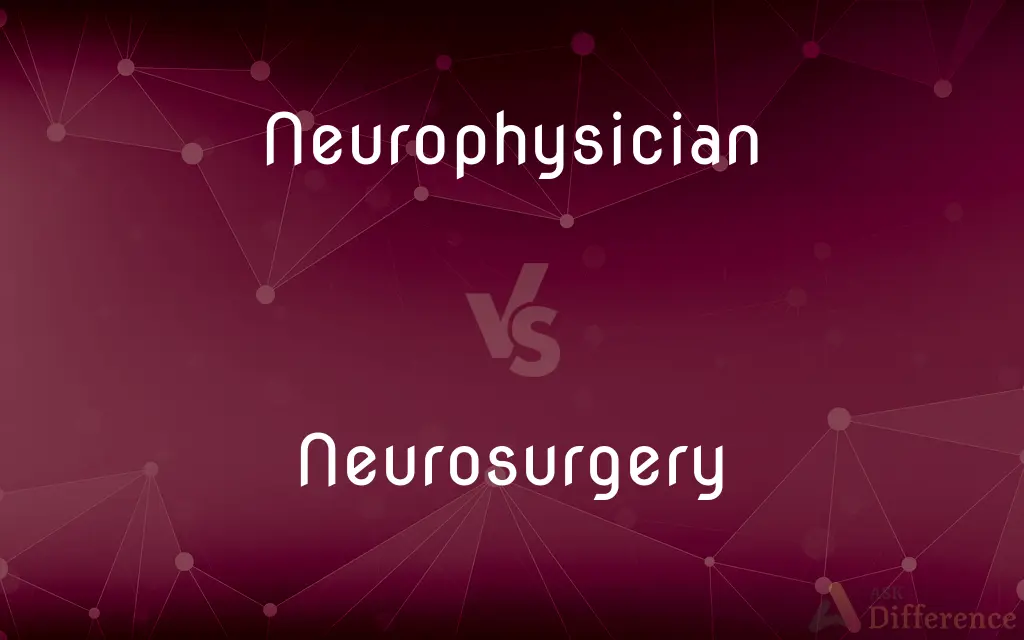Neurophysician vs. Neurosurgery — What's the Difference?
By Tayyaba Rehman & Urooj Arif — Published on February 9, 2024
A Neurophysician is a doctor specializing in the non-surgical treatment of neurological disorders; Neurosurgery involves surgical interventions for neurological conditions.

Difference Between Neurophysician and Neurosurgery
Table of Contents
ADVERTISEMENT
Key Differences
A Neurophysician is a medical doctor who specializes in diagnosing and treating neurological disorders through non-surgical means, focusing on the management of conditions like epilepsy, Parkinson's disease, and stroke. Neurosurgery, on the other hand, is a medical field that involves surgical procedures to treat disorders of the brain, spinal cord, and peripheral nerves, including operations for brain tumors, spinal disc herniation, and aneurysms.
Neurophysicians employ various diagnostic tests, such as MRI and CT scans, to understand and treat neurological conditions, using medications and therapies to manage symptoms. Neurosurgery requires a different skill set, including precision and expertise in surgical techniques to correct physical abnormalities or remove tumors within the nervous system.
While Neurophysicians often work in clinics or hospitals, providing long-term care and management for chronic neurological conditions, Neurosurgery is performed in a hospital setting, often requiring postoperative care in specialized units. The two professions, although distinct, frequently collaborate in comprehensive care teams to provide holistic treatment to patients with neurological issues.
The training pathway for a Neurophysician involves completing a medical degree followed by specialized training in neurology. For Neurosurgery, after medical school, an individual must undergo a rigorous surgical residency program focused on neurosurgical techniques, anatomy, and emergency procedures related to the nervous system.
Choosing between consulting a Neurophysician or a Neurosurgeon depends on the nature of the neurological condition; non-surgical issues are typically managed by a Neurophysician, while structural or operable conditions might necessitate a referral to Neurosurgery. Both roles are crucial in the comprehensive care of patients with neurological conditions, each offering specific expertise in their respective areas.
ADVERTISEMENT
Comparison Chart
Profession/Field
Medical specialty in neurology
Medical specialty in surgical treatment of nervous system
Treatment Approach
Non-surgical interventions
Surgical interventions
Conditions Treated
Epilepsy, migraines, Parkinson's, etc.
Brain tumors, spinal issues, aneurysms, etc.
Typical Procedures
Diagnostic tests, medication management
Brain surgery, spinal surgery, nerve repair
Required Training
Medical degree, neurology residency
Medical degree, neurosurgery residency
Compare with Definitions
Neurophysician
Focuses on the diagnosis of neurological disorders.
The Neurophysician used an EEG to assess her seizure activity.
Neurosurgery
Involves operations on the brain, spine, and nerves.
The Neurosurgery was successful in alleviating her chronic back pain.
Neurophysician
Manages chronic neurological conditions.
His Neurophysician recommended lifestyle changes to manage his Parkinson's disease.
Neurosurgery
The surgical specialty focused on the nervous system.
He underwent Neurosurgery to remove a benign brain tumor.
Neurophysician
Provides comprehensive neurological care.
The Neurophysician coordinated with other specialists to optimize her treatment plan.
Neurosurgery
Employs advanced techniques for neurological issues.
Neurosurgery has evolved with the introduction of minimally invasive procedures.
Neurophysician
A medical doctor specializing in neurology.
The Neurophysician diagnosed her with multiple sclerosis after a series of tests.
Neurosurgery
Requires precise surgical intervention.
The delicate Neurosurgery on his spinal cord restored his mobility.
Neurophysician
Expert in non-surgical neurological treatments.
After visiting the Neurophysician, he started new medication for his epilepsy.
Neurosurgery
Aims to correct structural neurological problems.
The aneurysm was treated with urgent Neurosurgery to prevent a rupture.
Neurosurgery
Surgery on any part of the nervous system.
Neurosurgery
The surgical discipline focused on treating those central and peripheral nervous system diseases.
Neurosurgery
Any surgical procedure performed on the brain; brain surgery.
Neurosurgery
Any surgery that involves the nervous system (brain or spinal cord or peripheral nerves)
Common Curiosities
What does a Neurophysician do?
A Neurophysician diagnoses and treats neurological disorders non-surgically.
Can a Neurophysician perform surgery?
No, a Neurophysician does not perform surgical procedures; that's the role of a Neurosurgeon.
How long is Neurosurgery training?
Neurosurgery training involves medical school plus a lengthy neurosurgical residency.
Are Neurophysician and Neurologist the same?
Yes, in many contexts, a Neurophysician is another term for a Neurologist.
What conditions require Neurosurgery?
Conditions like brain tumors, spinal disorders, and nerve injuries may need Neurosurgery.
Can Neurosurgery treat epilepsy?
Yes, Neurosurgery can treat certain cases of epilepsy not responsive to medication.
What advancements are there in Neurosurgery?
Advances include minimally invasive techniques and robotic-assisted surgery.
What is Neurosurgery?
Neurosurgery is a medical field that involves surgical treatment of the nervous system.
What's the training for a Neurophysician?
Neurophysicians complete medical school followed by a residency in neurology.
When should I see a Neurophysician?
Consult a Neurophysician for non-surgical management of neurological conditions.
Is Neurosurgery risky?
All surgeries carry risk, but Neurosurgery is performed with precision to minimize complications.
What's the difference in follow-up care between Neurophysician and Neurosurgery?
Post-surgery, Neurosurgery patients may need rehabilitation, whereas Neurophysician patients often require ongoing medication management and monitoring.
What diagnostic tools do Neurophysicians use?
Neurophysicians use MRI, CT scans, EEG, and other tests to diagnose neurological conditions.
Can a Neurophysician treat stroke?
Yes, Neurophysicians play a key role in the acute and long-term management of stroke patients.
Do Neurophysicians prescribe medication?
Yes, Neurophysicians commonly prescribe medication to manage neurological conditions.
Share Your Discovery

Previous Comparison
Nicene Creed vs. Apostles Creed
Next Comparison
Durga Puja vs. DussehraAuthor Spotlight
Written by
Tayyaba RehmanTayyaba Rehman is a distinguished writer, currently serving as a primary contributor to askdifference.com. As a researcher in semantics and etymology, Tayyaba's passion for the complexity of languages and their distinctions has found a perfect home on the platform. Tayyaba delves into the intricacies of language, distinguishing between commonly confused words and phrases, thereby providing clarity for readers worldwide.
Co-written by
Urooj ArifUrooj is a skilled content writer at Ask Difference, known for her exceptional ability to simplify complex topics into engaging and informative content. With a passion for research and a flair for clear, concise writing, she consistently delivers articles that resonate with our diverse audience.













































